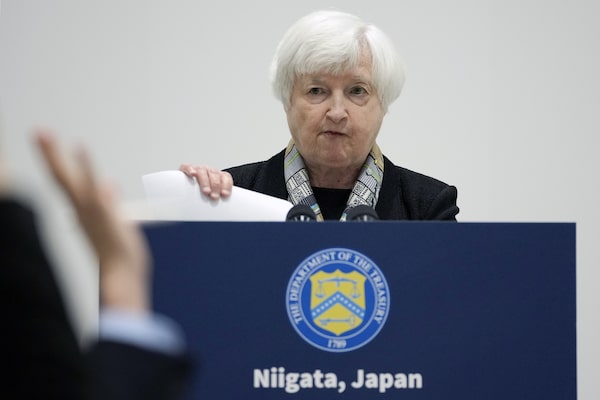
U.S. Treasury Secretary Janet Yellen takes part in a news conference at the G7 meeting of Finance Ministers and Central Bank Governors, at Toki Messe, in Niigata, Japan, on May 11.Shuji Kajiyama/The Associated Press
Treasury Secretary Janet Yellen said there was still uncertainty about exactly when Treasury would run out of cash to pay the U.S. government’s debts, but she would keep Congress apprised of any change in the date, which could come as early as June 1.
Yellen told Bloomberg TV that she would meet with senior Wall Street bankers on the federal debt ceiling next week, and she viewed it as appropriate for them to speak out about how the debate over the debt limit was affecting the U.S. economy.
Speaking on the sidelines of a meeting of finance officials from the Group of Seven (G7) rich nations in Japan, Yellen reiterated that failure by Congress to raise the $31.4-trillion debt limit would result in economic and financial catastrophe.
Yellen told lawmakers last week that Treasury would likely be unable to pay all the government’s bills as early as June 1 without an increase in the federal debt limit.
President Joe Biden’s Democrats and Republicans, who control the U.S. House of Representatives remain at odds over the need to raise the debt limit, which reflects previously spent federal money. Biden insists that Congress has a constitutional duty to raise the debt ceiling without conditions, while Republicans have tied any increase to sweeping budget cuts.
The U.S. president this week said he might have to skip travelling to Hiroshima to meet with G7 leaders next week, depending on developments in the debt ceiling standoff. Biden had planned to meet with top Democratic and Republican congressional leaders again on Friday after an initial session on Tuesday, but has postponed that meeting until next week.
Unlike most developed countries, the U.S. sets a ceiling on how much it can borrow. Because the government spends more than it takes in, lawmakers must periodically raise that cap.
Yellen dodged a question on whether Treasury would keep making payments on securities if the debt ceiling was breached – a possibility raised during an earlier debt ceiling debate. She said there was no good option other than for Congress to raise the debt limit, as it has done nearly 80 times since 1960.
“We’ve not discussed what to do if that doesn’t occur with the president. Our focus is getting it done,” she said, adding that she and other government officials were “working full-time” with Congress on increasing the federal borrowing limit.
Yellen said Treasury might be able to provide more refined guidance on exactly when it would run out of cash to pay the government’s bills as the date neared.
“There remains a level of uncertainty about precisely when we would run out of cash to pay the government’s bills,” she said, citing some uncertainty about the level of cash balances and day-to-day payments that Treasury needed to make.
German Finance Minister Christian Lindner on Friday told reporters he hoped U.S. politicians would come to a “grown-up” decision to raise the federal debt ceiling, warning there was a risk to the global economy if they did not.
Lindner said the global economic outlook was still “fragile” and he hoped the parties would not be driven by partisanship.
“That’s why we’re looking at the United States in particular these days and hoping that an adult decision will be made with regard to the development of American government finances and the associated effects on the global economy,” he said.